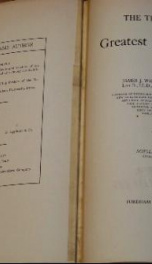religion and health

Purchase of this book includes free trial access to www.million-books.com where you can read more than a million books for free. This is an OCR edition with typos. Excerpt from book: CHAPTER III SACRIFICE The essence of religion is sacrifice. St. Paul summed it up in his own inimitable fashion when he said, "I beseech you therefore, brethren, by the mercies of God, that ye present your bodies a living sacrifice, holy, acceptable unto God, which is your reasonable service." The supreme exercise of religious feeling is the readiness to make sacrifices because one feels that it is the will of the Deity that they should be made. The "Century Dictionary's" definition of sacrifice, "the giving up of some prized or desirable thing in behalf of a higher object", represents the state of mind that one must have if one is desirous of practicing religion sincerely. The tendency to make sacrifices seems almost to be ingrained in humanity and to be a sort of instinct. It is one of these precious manifestations of nature so difficult to understand and yet representing some great basic principle of humanity. The feeling of satisfaction that comes with it represents that compensation for the exercise of a natural function which so often accompanies natural processes and is sometimes supposed to be a feature only of the physical yet is so invariably found also in the moral order. From the very earliest times men have made sacrifices in the spirit of religion. Now that the story of the cave man is known not by inference but by actual discoveryof his remains in the caves of western France and northern Spain, we find that he was an artist who invented oil colors, grinding the oxides of manganese and of iron in mortars and mixing them with the rendered fat of animals and painting some of the most vivid pictures of animals that have ever been made on the walls of his cave in order to make his home beautiful. Instead of being just a little better than the beasts, he was an a...
Info about the book
Author:
Series:
Unknown
ISBN:
6071109051
Rating:
3.5/5 (3)Your rating:
0/5
Languge:
English
Users who have this book
Users who want this book
What readers are saying
What do you think? Write your own comment on this book!
write a commentif you like religion and health try:
Do you want to read a book that interests you? It’s EASY!
Create an account and send a request for reading to other users on the Webpage of the book!






